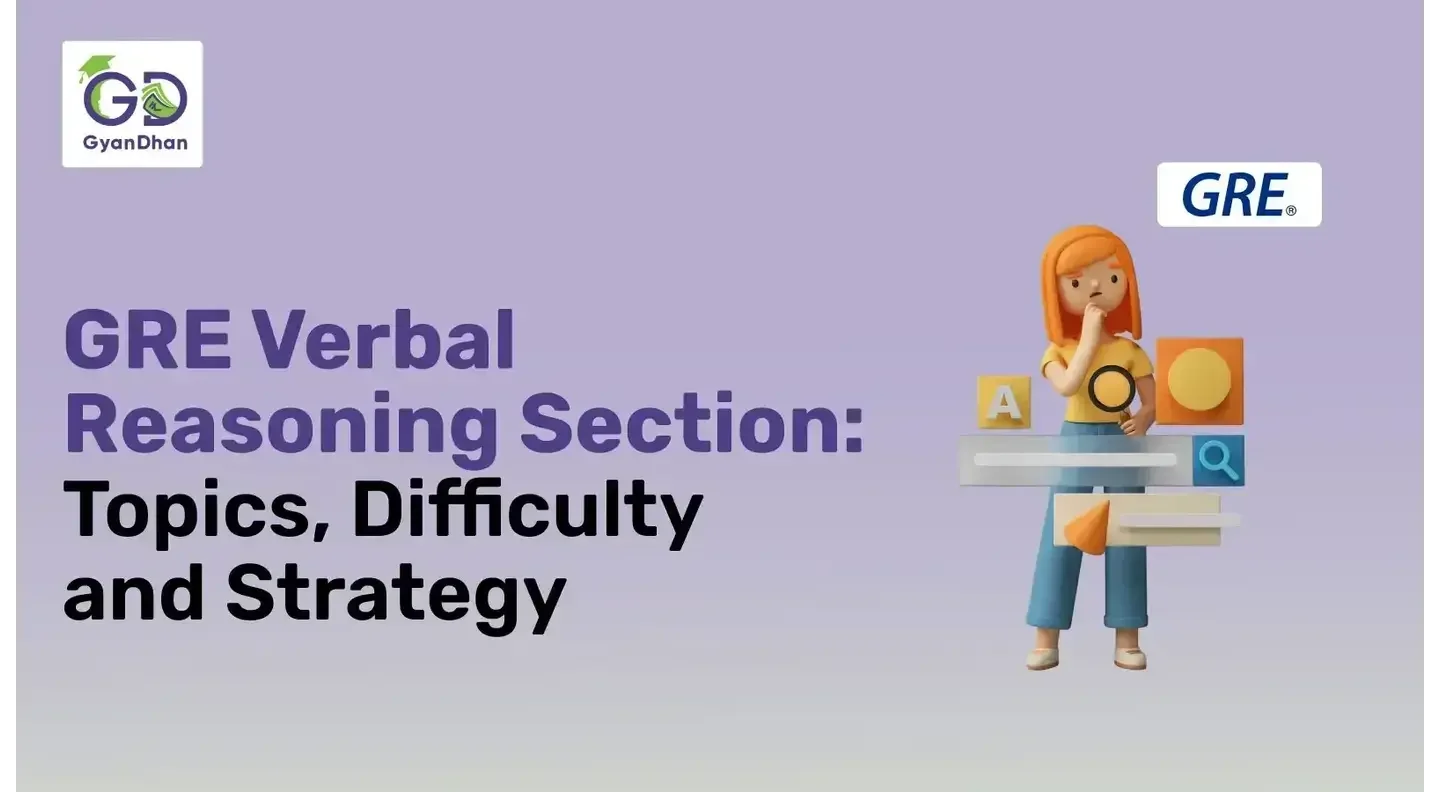Get instant loan offer suitable to your profile !


On this Page:
Understand GRE verbal reasoning topics, question types, difficulty & smart strategies. Practice with mocks & learn how to excel.
In this article, we will discuss the verbal reasoning sections of the GRE exam. The Verbal Reasoning section of the GRE can be confusing for exam takers. Students usually assume that it is all about vocabulary, but in fact, it is your in-depth understanding of the English language. You have to analyse and interpret the written material to see through the confusing options and choose the correct answer. With the right approach and sufficient practice, you can improve quickly. In this article, we will break it down for you and help you understand the verbal reasoning section thoroughly.

The Verbal Reasoning section measures your ability to:





The latest format of the GRE verbal reasoning is as follows:




Please note that each section is separately timed and adaptive based on your performance.

Now, let us take a closer look at the types of questions with examples. These are similar to official ETS materials:
In reading comprehension or RC, you have to read and understand a passage and answer the questions based on its content. The questions may ask about the main idea, specific details, tone, or logical structure. It will be clear from the following example.
In recent years, the popularity of electric vehicles (EVs) has increased significantly. While they are praised for their environmental benefits, some critics argue that the electricity they use is often generated from non-renewable sources.
Which of the following best describes the author’s attitude?




Answer: (B)
These questions present a short passage with 1 - 3 blanks. You have to choose one word or more than one word that best completes the text. We will explain this with an example:
Although he was often considered arrogant, his _____ manner and thoughtful questions revealed a more humble side.




Answer: (B) unassuming
You choose two words that complete the sentence and produce sentences with the same meaning. Let us see an example of sentence equivalence:
Her approach to teaching was both _____ and effective, helping students grasp difficult concepts with ease.






Answer: (A) and (E)

This section can be tricky, especially for those students who do not have English as their first language or are not habituated to reading dense texts. Vocabulary is challenging, and passages often include complex sentence structures and unfamiliar topics. The following are the reasons which make this section somewhat tricky:





The following are some of the strategies you can use to get a good score in the GRE verbal reasoning section:
Focus on high-frequency GRE words. Use flashcards, apps or vocabulary notebooks.
Practice reading complex articles from sources like The Atlantic, Scientific American, or The Economist. Summarize each paragraph mentally.
Always consider the tone, purpose, and context of the passage. Look for clue words that hint at contrast or continuation.
Most verbal questions can be narrowed down. Eliminate options that are too extreme or out of context.
Make GRE verbal a daily habit. Use official ETS materials and third-party sources like GregMat or Manhattan Prep.
Do not just memorise definitions. Understand how words are used in context.
If a passage or question is too hard, mark it and return later. Solve easy questions first, and then come back to your marked questions. Do not get stuck on one question.

The key to scoring good marks in this section is practice. The more you practice, the more familiar you will be with the type of passages. Make sure you practice in real test-like conditions, which can help you improve your timing and confidence. The following are the resources you can use:




We recommend that you follow these tips when giving mock tests:



Please note that if obtaining feedback and working on your weak areas is very important to succeed and score high during the actual test. Only giving a mock test will not help if you do not work on your shortcomings.

No matter what your GRE score is, you may be eligible for up to INR 5,00,000 through the GyanDhan Scholarship.



The GRE Verbal Reasoning section rewards critical thinking and focused practice. You can score well in this section if you:




Take it step by step and you will come out with flying colours.

It depends on your background. Students from STEM backgrounds often find verbal skills harder due to vocabulary and reading comprehension. But with regular practice, you can easily score well.
A score above 155 is considered good. A 160+ score puts you in a strong position for top universities.
Learn and practice high-frequency words and actively use apps like Magoosh Vocabulary Builder, and read challenging English content regularly.
Yes, you can mark questions and return within the section’s time limit. Accuracy always matters more than rushing.
Start with ETS Official Guide, then use GregMat, Magoosh, Manhattan Prep, and practice with PowerPrep tests.
Check Your Education Loan Eligibility

Ask from a community of 10K+ peers, alumni and experts
Trending Blogs
Similar Blogs

Network with a community of curious students, just like you
Join our community to make connections, find answers and future roommates.. Join our CommunityCountry-Wise Loans
Best Lenders for Education Loan

ICICI Bank

Axis Bank

Union Bank

Prodigy

Auxilo

Credila

IDFC

InCred

MPower

Avanse

SBI

BOB

Poonawalla

Saraswat